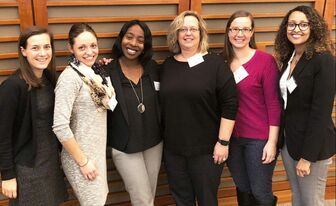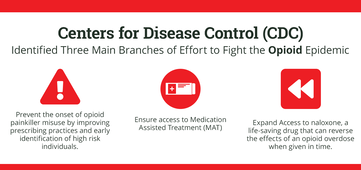|
An Interview with Victoria Adewumi, MA, Community Liason, City of Manchester Health Department NaRCAD Training Alumna by Kayland Arrington, MPH, Program Manager at NaRCAD Tags: Detailing Visits, Opioid Safety, Program Management, Training  Victoria @NaRCAD2018's panel on AD for the opioid crisis. Victoria @NaRCAD2018's panel on AD for the opioid crisis. NaRCAD: How did you get into AD? How was the Manchester team formed? Victoria: I was very interested in community outreach and improving the health and well-being of families! I had cursory experience with substance use disorder management and had to jump in with both feet. It really helped having other detailers on the team that NaRCAD trained that I could lean on. The other detailers constantly provided support, and one helped open the door for me at her health system to speak with clinicians. She even provided me talking points that previously worked for her so I could walk into my first appointment feeling confident.  NaRCAD: What has your experience been as a detailer who does not have clinical experience but who does have public health expertise? Is someone able to be effective as an academic detailer without as much prior clinical training? Victoria: My experience has been extremely positive! I care about community, and I thought this was a great opportunity to gain new expertise in this field. I’ve always felt that a community perspective is needed for us to be able to leverage our impact in this field. The NaRCAD Academic Detailing techniques training was fantastic in helping me build tools to be able to speak well and motivate clinicians around medication-assisted treatment (MAT). My goal as an individual detailer is always to present myself as being on the same team as clinicians. I really see detailing as having a solution for clinicians, rather than simply trying to sell them an idea.  Manchester is located in Hillsborough County, NH Manchester is located in Hillsborough County, NH NaRCAD: Was there a time when a clinician presented pushback or obstacles that made it difficult to get your message across? Victoria: Some clinicians seemed to have already decided whether they were going to be on board or not before I even met with them. I had to feel strong and confident in the skills that I have. When I meet with a clinician, I always frame it as “I’m coming in as a representative of the community. There’s a crisis in our community, and you, as a provider, are a key part of the solution. How can we get you involved?” and “What kinds of things can you tell us that we haven’t even thought about before?” We need everyone’s participation if we’re going to change the tide of the city of Manchester, and clinicians are a vital part of that.
NaRCAD: You have mentioned the power of the team of detailers--can you tell us how the Manchester AD came to be so strong and effective? Victoria: I didn’t know any of the other detailers before the project. The NaRCAD training was great as an introduction to the work and to each other. We all had a sense of hope that was immediately apparent. We have the privilege of doing work that helps save lives and because of this attitude, there was a sense of camaraderie right away. We’ve been effective because our AD team is strong, and it was strong because we were intentional about building bonds. During the implementation period, we never went more than a month without checking in with each other, and sharing successes and challenges. I don’t think I would have enjoyed the process as much if I didn’t have this amazing AD team of colleagues. We’ve had incredible success in building a team of detailers who are all committed to and excited about the work of connecting with frontline clinicians to improve patient care around opioid safety.  NaRCAD: How would you recommend other programs go about recruiting those people that are equally committed and excited? Victoria: That’s a great question! I didn’t necessarily have an opioid response background, but I’ve always cared about communities. That desire to help others makes a great detailer. The trainings can teach the clinical content, but that element of wanting to improve people’s lives is the anchor of a strong AD team, and will resonate with the providers you’ll be detailing. I would then advise new sites to do the important work of helping their detailers to build strong relationships and a sense of teamwork right from the beginning. Those relationships will support everything, from good communication with clinicians, to a renewed sense of purpose in doing the work, which shields against burn out moving forward. Consistent opportunities to check in and connect between AD team members can’t be overemphasized—it truly made me feel that I was never in this alone; I was always working as part of something bigger than myself.  Biography Victoria Adewumi, MA Community Liaison City of Manchester Health Department Victoria Adewumi is a Community Liaison with the Manchester Public Health Department. Victoria primarily helps coordinate and staff programming of the Manchester Community School Project, a model that facilitates better health for Manchester residents through place-based interventions. Victoria serves Manchester residents by linking them to partners in the health, social service, business, non-profit, and faith communities and by engaging community members in resident leadership and equity activities. Victoria also participates in efforts to serve refugees and newcomers in New Hampshire through both direct service and community-building initiatives. Victoria holds Bachelor and Master of Arts Degrees in Political Science from the University of New Hampshire.
0 Comments
Leave a Reply. |
Highlighting Best PracticesWe highlight what's working in clinical education through interviews, features, event recaps, and guest blogs, offering clinical educators the chance to share successes and lessons learned from around the country & beyond. Search Archives
|
